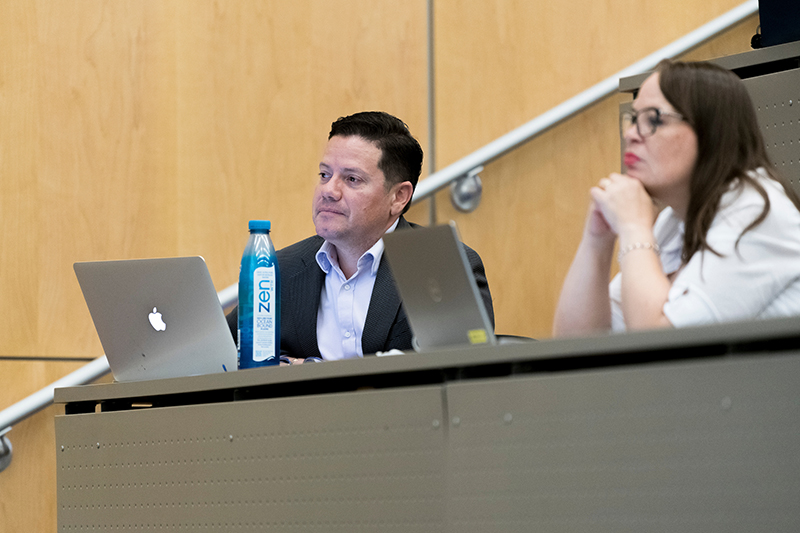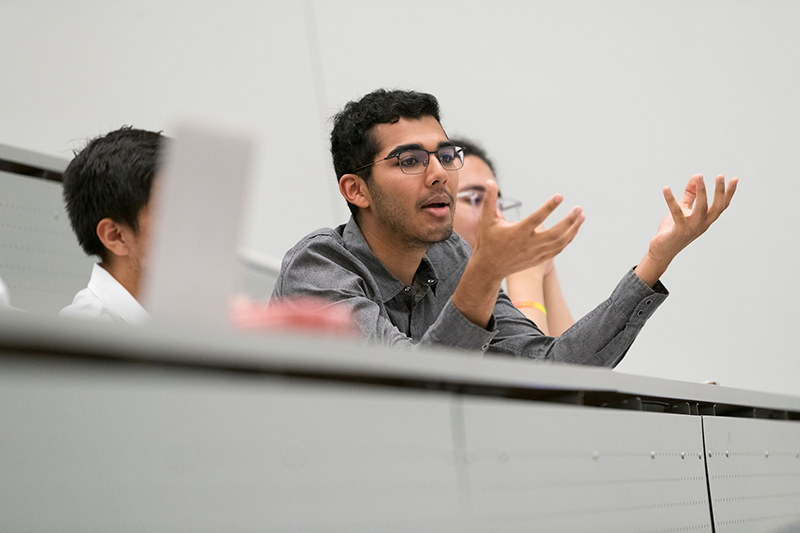August 25, 2023
Purdue-Colombia undergrad research program expands; similar student engagement efforts planned for Mexico, Brazil, Ecuador, Peru
Successful model celebrates honorable mention recognition from 2023 IIE Heiskell Award for Innovation in International Education
Building on the decadelong success of an undergraduate student research engagement effort with leading universities in the South American country of Colombia, Purdue University is planning to launch similar programs on a smaller scale to create opportunities for students in Mexico, Brazil, Ecuador and Peru.
Purdue established the Undergraduate Research Experience Purdue-Colombia program, known as UREP-C, in 2014, bringing college seniors to the West Lafayette campus for six months to work with Purdue faculty on a senior research project. The inaugural class had 24 students 10 years ago.
 Juan Diego Velásquez, Purdue’s assistant director of global partnerships and director of Latin American Programs and the Colombia-Purdue Partnership, listens to Colombian students’ presentations during their senior projects symposium on July 19 at the Armstrong Hall of Engineering. (Purdue University photo/John Underwood)
Download image
Juan Diego Velásquez, Purdue’s assistant director of global partnerships and director of Latin American Programs and the Colombia-Purdue Partnership, listens to Colombian students’ presentations during their senior projects symposium on July 19 at the Armstrong Hall of Engineering. (Purdue University photo/John Underwood)
Download image
As the global COVID-19 pandemic was subsiding, UREP-C was expanded in the fall of 2021 to accommodate spring and fall cohorts of between 40-50 students each, says Juan Diego Velásquez, assistant director of global partnerships at Purdue and director of Latin American Programs and the Colombia-Purdue Partnership.
During the just-completed spring and summer 2023 session, 38 students participated. A class of 48 students arrived this week for the fall term, and another 48 students are set to begin their Purdue-Colombia experience in February 2024, Velásquez says.
“We’re creating opportunities. Because of the financial backgrounds of many of these students, we’re opening up the world to those who never thought this world was accessible to them,” Velásquez says. “Many of these students had never been on a plane before. And for most of them, this was the first time they needed a passport to travel outside Colombia.”
 Undergraduate Research Experience Purdue-Colombia participant Steven Montoya, who is studying mechanical engineering, asks a question during presentations from fellow students at the senior projects symposium for the program. (Purdue University photo/John Underwood)
Download image
Undergraduate Research Experience Purdue-Colombia participant Steven Montoya, who is studying mechanical engineering, asks a question during presentations from fellow students at the senior projects symposium for the program. (Purdue University photo/John Underwood)
Download image
Related Story
A similar Purdue program for students from Brazil was launched in 2022 and another is gearing up for undergraduate students from Mexico, Velásquez says. Other programs in the works specifically for the College of Science will reach out to undergraduate students from Colombia, Ecuador and Peru.
For the first three years, the Purdue-Colombian partnership focused mainly on students in academic areas related to agriculture, engineering and science. That has gradually expanded to include students in other disciplines, including two students this spring and summer from College of Liberal Arts programs, Velásquez says.
“What having a diversified portfolio of different Purdue disciplines available to Colombian students has done has prompted our colleges to find individual and unique ways to connect with what we have in Colombia,” he says. “I don’t speak on behalf of the colleges. I try to connect our Purdue colleges with the Colombian universities that have the right infrastructure, the right mix of offerings, and then I support the process along the way. But I let the colleges choose.”
The program experienced a major boost in 2019. That year, Colombian partners and now-Purdue President Mung Chiang, who was the John A. Edwardson Dean of the College of Engineering at that time, signed agreements to increase to six the number of participating Colombian universities. Added to the Universidad Nacional de Colombia (UNAL) in Bogotá that year were Universidad de los Andes (UniAndes) and Pontificia Universidad Javeriana in Bogotá; Universidad de Cartagena in Cartagena; Universidad EAFIT and Universidad Nacional de Colombia (UNAL) Medellín in Medellín; and Universidad del Norte in Barranquilla.
“Building on the success of the program under President Mitch Daniels and now with President Chiang in leadership and the active global approach he has taken makes the work that I do easier, more visible, more impactful and meaningful,” Velásquez says.
Additional Information
- Undergraduate Research Experience Purdue-Colombia
- Institute of International Education’s 2023 Heiskell Awards for Innovation in International Education Honorable Mention: Strategic Partnerships
- Institute of International Education
Land-grant call to global student engagement
With its 2014 launch, the Undergraduate Research Experience Purdue-Colombia was built on the striking parallels that exist between the Colombia of today and the United States when Purdue was established as Indiana’s land-grant university in 1869: war-torn nations with complex multicultural populations, vast underdeveloped territories, and people eager to prosper using new knowledge and technology.
Land-grant universities felt the call to open the doors of higher education to a population without access because of economic and financial constraints, Velásquez says. Today, U.S. universities like Purdue, he adds, are fulfilling that land-grant promise while evolving to address the needs of a globally connected world for the well-being of people here and abroad. That’s evidenced by the success of the Purdue-Colombia collaboration, which is aimed at creating opportunities for underrepresented undergrads in that country.
“We geographically share one continent. If we want to address issues of immigration, if we want to address the issue of social unrest, if we want to help address the economic challenges in that part of the world, we need to help Central and South America, so they have options and opportunities that don’t involve having to migrate to the north,” Velásquez says. “And higher education is the way to do it.”
Additionally, since its inception a decade ago, the international Purdue program has seen more than two-thirds of the students deciding to continue on to graduate school, with many completing doctoral degrees, Velásquez says.
“We have an incredibly compelling story. Purdue has benefited by having more than 70 students coming back for their master’s or PhD degrees,” he says. “There’s probably an equal number of students who have attended other universities around the world – a lot of them in Europe. Probably two-thirds of the students have continued their graduate studies because of their Purdue-Colombia experience.”
The response to the program from Purdue’s faculty community has been “nothing short of amazing,” Velásquez adds. “Now I have faculty members coming to me, asking, ‘Do you have Colombian students in this particular area?’ They have become strong advocates of the program. That’s very different from when we started.”
Moreover, the Purdue program is a model nationally and globally, drawing accolades from leading higher education organizations.
The Institute of International Education, a leader in designing and implementing international education strategies and program services, recognized the Undergraduate Research Experience Purdue-Colombia program in May. Purdue’s program gained an honorable mention in the Strategic Partnerships category as part of the 2023 IIE Andrew Heiskell Awards for Innovation in International Education.
“We’re very proud and honored to have been recognized by IEE, which is the largest U.S. organization focused on international higher education,” Velásquez says.
Writer: Phillip Fiorini, pfiorini@purdue.edu, 765-430-6189

